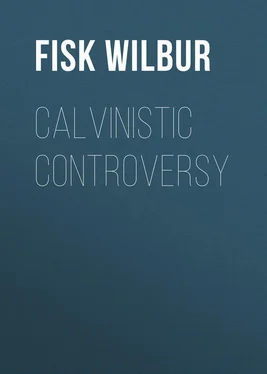Wilbur Fisk - Calvinistic Controversy
Здесь есть возможность читать онлайн «Wilbur Fisk - Calvinistic Controversy» — ознакомительный отрывок электронной книги совершенно бесплатно, а после прочтения отрывка купить полную версию. В некоторых случаях можно слушать аудио, скачать через торрент в формате fb2 и присутствует краткое содержание. Жанр: foreign_antique, foreign_prose, на английском языке. Описание произведения, (предисловие) а так же отзывы посетителей доступны на портале библиотеки ЛибКат.
- Название:Calvinistic Controversy
- Автор:
- Жанр:
- Год:неизвестен
- ISBN:нет данных
- Рейтинг книги:4 / 5. Голосов: 1
-
Избранное:Добавить в избранное
- Отзывы:
-
Ваша оценка:
- 80
- 1
- 2
- 3
- 4
- 5
Calvinistic Controversy: краткое содержание, описание и аннотация
Предлагаем к чтению аннотацию, описание, краткое содержание или предисловие (зависит от того, что написал сам автор книги «Calvinistic Controversy»). Если вы не нашли необходимую информацию о книге — напишите в комментариях, мы постараемся отыскать её.
Calvinistic Controversy — читать онлайн ознакомительный отрывок
Ниже представлен текст книги, разбитый по страницам. Система сохранения места последней прочитанной страницы, позволяет с удобством читать онлайн бесплатно книгу «Calvinistic Controversy», без необходимости каждый раз заново искать на чём Вы остановились. Поставьте закладку, и сможете в любой момент перейти на страницу, на которой закончили чтение.
Интервал:
Закладка:
3. “But,” say the advocates of this system, “supposing there are difficulties in this subject, the Scriptures abound with passages which at once prove the doctrine.” If this is true, then indeed we must submit. But the question is, where are these passages? After such a strong assertion, it would probably appear surprising to one unacquainted with this subject, to learn that there is not a single passage which teaches directly that God hath foreordained whatsoever comes to pass. Yet this is the fact. If this doctrine is taught in Scripture, it is in an indirect manner. Nor will it follow, because God hath predestinated some things, that he hath, therefore, decreed all things. All those passages then which have been so frequently quoted as proof of this doctrine, which only go to prove, that God hath predetermined certain events, are not proof in point. Where are the passages that say he hath decreed all things? We know of many which say of certain events that have come to pass, that God did not command them, nor will them; so that the abundant Scripture proof seems altogether on the other side of the question. It is argued, however, that certain acts of moral agents, even those acts for which they are held responsible, are, according to the Scriptures, the results of God’s predetermination, and therefore it is reasonable to infer that all are. This general conclusion, however, is not contained in the premises; nevertheless, if the premises are true, if it can be proved from Scripture that God holds his creatures responsible for the results of his own decrees, such Scripture proofs would be strong arguments to ward off the objections that are brought against this system. For if it is consistent with a righteous God to make a moral agent responsible for one event which was the result of a Divine decree, upon the same principle, perhaps, he might make him responsible for all, though all were decreed. Let us then look at those scriptures, “As for you,” says Joseph to his brethren, speaking of their injustice to him, “ye thought evil against me, but God meant it for good.” Now without stopping here to inquire whether Joseph was inspired to utter this sentiment, we are ready to acknowledge, that there are a number of similar scriptures which teach that, in the results of the wicked acts of wicked men, God had a design and a controlling influence, and thereby made them subservient to his own purposes. He hath wisdom and power “to make the wrath of man praise him, and to restrain the remainder of wrath.” But does he therefore decree the wrath itself? And is this wrath necessary to the accomplishment of his purposes? As well might it be said, that because a government, in quelling a rebellion, replenished its exchequer from the confiscated estates of the rebels, therefore that government decreed the rebellion, and was dependent upon it for the prosperity of the nation. Let it be distinctly understood then, that to overrule and control the results of an act is altogether different from making the act itself the result of an overruling and controlling power.
Again it is said, “The Lord hath made all things for himself, yea, even the wicked for the day of evil.” That the Lord hath made all things for his own glory, is a proposition easily understood, and doubted, I trust, by none; and this is evidently the meaning of the former member of this passage. The latter clause, if it helps the cause for which it is quoted at all, must mean, that the Lord has predestinated men to be wicked, that he might make them miserable. But it is not necessary to make the text speak this shocking sentiment. We should do the text no violence to explain it thus – The Lord hath destined the wicked for the day of evil, and this shall be for his glory.
But there is another class of passages like the following: – “He doeth according to his will in the army of heaven, and among the inhabitants of the earth.” “He worketh all things after the counsel of his will.” “I will do all my pleasure.” But these passages establish nothing, in opposition to our views, unless it should first be proved, by other passages, or in some other way, that it is God’s will and pleasure to work all things , even wickedness, in the wicked. These scriptures prove that all God’s works are in accordance with his own will and pleasure; and that he will accomplish them in spite of the opposition of sinners. If it pleases him to form his moral government, so as to leave the responsible acts of his subjects unnecessitated by his decree, this he will do, for “he will do all his pleasure.”
But there is still another class of texts, which are supposed to favour the doctrine we are opposing, more than any others, viz. those passages which seem to represent God as bringing about and procuring the wickedness of the wicked. Like the following: – “And I will harden Pharaoh’s heart, that he should not let the people go.” “Now therefore the Lord hath put a lying spirit in the mouth of all these thy prophets.” “He hath blinded their eyes and hardened their hearts.” “Him, being delivered by the determinate counsel and foreknowledge of God, ye have taken, and by wicked hands ye have crucified and slain.” On these and similar passages it may be remarked, that God blinds men and hardens their hearts judicially, as a just punishment for their abuse of their agency. And for this act of his, in blinding and hardening them, he does not make them responsible. But he holds them responsible for that degree of wickedness which made it just and necessary to give them over to this hardness of heart and blindness of mind. And since there are wicked men and lying spirits, they become fit instruments in deceiving and tormenting each other; and therefore God gives them power and liberty to go abroad, “deceiving and being deceived.” But how does this prove that God hath decreed sin? The idea that God hath made sin and wicked spirits the instruments of hardening and tormenting the incorrigible sinner, and finally of shutting the door of hope against him, has no kind of affinity to the idea, that he decreed the sin which occasioned this hardness, or ordained the wickedness of this lying spirit.
As to the passage from the Acts, none of us deny but that Jesus Christ was delivered up to suffer and die, by the determinate counsel and foreknowledge of God; but it is most emphatically denied, that this or any other scripture proves, that the taking and slaying of Jesus Christ by wicked hands, was the result of the determinate counsel and foreknowledge of God. If any think otherwise, let them prove it.
Having stated and, as our time would permit, examined the arguments in favour of the sentiment we are opposing, we are prepared to urge against this doctrine, not only that its arguments are unsound and insufficient, but also that the system itself is liable to the most serious and formidable objections.
1. This doctrine of predestination makes God the author of sin. Some acknowledge this, and expressly assert, that God is the “ efficient cause” of sin. Others affirm it in fact, while they deny it in word. Take for instance the words of Calvin. “I will not scruple to own,” he says, “that the will of God lays a necessity on all things, and that every thing he wills, necessarily comes to pass.” In accordance with this, Piscator, Dr. Twiss, Peter Martyr and others tell us, that “God procures adultery, cursings, and lyings” – “God is the author of that act, which is evil” – “God, by his working on the hearts of the wicked, binds them and stirs them to do evil.” They deny, however, that God is the author of sin, because they say, “God necessitates them to the act , and not to the depravity of sin:” or, that “God does not sin when he makes men sin, because he is under no law, and therefore cannot sin.” But these are miserable shifts. Has not the deformity of sin come to pass? Then God has decreed this deformity. To deny this, is to give up the doctrine. But to acknowledge it, is to own that God is as much the author of the deformity, as he is of the act. Again, God doubtless decreed that sin should be sin , and not holiness; and it came to pass as sin, because it was so decreed. Is he not then the direct procuring cause? A thousand turns of this kind, therefore, are nothing but evasions. The fiat of God brought forth sin as certainly as it made the world.
Читать дальшеИнтервал:
Закладка:
Похожие книги на «Calvinistic Controversy»
Представляем Вашему вниманию похожие книги на «Calvinistic Controversy» списком для выбора. Мы отобрали схожую по названию и смыслу литературу в надежде предоставить читателям больше вариантов отыскать новые, интересные, ещё непрочитанные произведения.
Обсуждение, отзывы о книге «Calvinistic Controversy» и просто собственные мнения читателей. Оставьте ваши комментарии, напишите, что Вы думаете о произведении, его смысле или главных героях. Укажите что конкретно понравилось, а что нет, и почему Вы так считаете.












